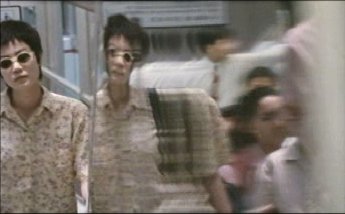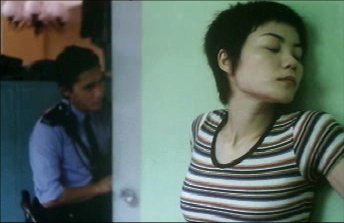Some of Faye’s character was reputedly influenced by the character Midori in Haruki Murakami’s ‘pop’ novel, Norwegian Wood, and this can be seen in her distinctive short hair (also a nod to Jean Seberg’s character in Jean-Luc Godard’s A Bout De Souffle) and ebullient outlook. Reflecting Murakami’s novel, she can be seen as the embodiment of looking towards the future and releasing the burden of the past. It is Faye who dreams of the (potential) future, to suitably themed music, while Leung still clings on in his memory to his ex. The notions of dreams and memories are so ethereal that the depiction of such on film is surely a coup of some measure. Yet that is what Wong Kar Wai manages to weave: sublime essences of feelings bubbling up on screen. For instance, we have surely one of the most lyrical portrayals of a past relationship imaginable (Leung and his ex, Valerie Chow, playing with aeroplanes in his apartment to Dinah Washington and recorded air safety instructions - all filmed liltingly in handheld), and all this builds up to the audience being immersed in the importance of his loss, which apparently goes to the very root of his being. But when we see his ex for the last time (and they speak together for the first time), they have the most casual, off-hand shell of a conversation imaginable. His ex is characterised so differently from his memory that we are aware of having experienced his sphere of consciousness, and just how much this varies with a more objective viewpoint. And this is Wong Kar Wai’s great strength, as far as I’m concerned, as more so than with any other director, one abandons the ‘viewer’ position and is immersed not just in an existence, but in a consciousness, yet without feeling the need to transplant the ‘self’ as a character substitute. How Wong Kar Wai does this is to truly create the subjective incarnation of consciousness - when we see Leung’s memories, they have the richness and trueness of feeling of memories direct rather than being a mere descriptive template - and so the viewer is unable to merely ‘take note’ of the viewpoint and reflect upon it as merely objective ‘viewer’: instead, it is made to be felt.
|
As far as the relationship of the ‘present’ substance of the film goes, that is to say between Leung and Faye, the connection between the two characters is gently built and hinted upon, and is not even reciprocated until the end, with mixed desires and lives foreshadowing the eventual move to epiphany like self-awareness on Leung’s part, which is counterbalanced by Faye’s own self doubt. But that makes the journey all the more rewarding, and the feelings all the more deep. The final, open-ended scene is one of the most emotionally careful yet profoundly evocative moments in cinema - the characters still talking in codes, still giving off assured sheens of cool laced with anticipation, yet the moment bristling with the pure potentiality which the film has been building up to: whether the moment will be grasped or lost.
|

